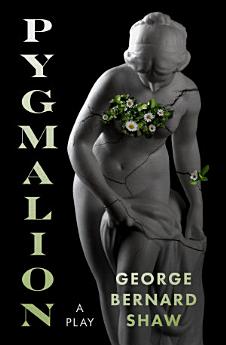Pygmalion: A Play
เม.ย. 2020 · Open Road Media
eBook
86
หน้า
family_home
มีสิทธิ์
info
reportคะแนนและรีวิวไม่ได้รับการตรวจสอบยืนยัน ดูข้อมูลเพิ่มเติม
เกี่ยวกับ eBook เล่มนี้
The most successful play by the Nobel Prize–winning Irish playwright, and basis for the movie and Broadway musical My Fair Lady.
Based on the Greek legend of Pygmalion and Galatea, George Bernard Shaw’s witty adaptation features linguistic expert Professor Henry Higgins, who encounters a cockney flower seller named Eliza Doolittle. Boasting that he could pass Eliza off as a duchess by teaching her to speak correctly and polishing up her manners, Higgins does not believe he will ever have to prove his claim—until Eliza shows up on his doorstep asking for elocution lessons.
Eliza’s subsequent transformation fools London society, but makes both Eliza and Higgins question whether they can return to the lives they had before their extraordinary experiment.
“Pygmalion, written in 1912 at a time when women’s suffrage was making daily headlines, stages both Shaw’s progressive belief in the equality of the sexes, as well as his satire of the defiant persistence of Victorian customs and the English class system in the face of inevitable social progress.” —BroadwayWorld
Based on the Greek legend of Pygmalion and Galatea, George Bernard Shaw’s witty adaptation features linguistic expert Professor Henry Higgins, who encounters a cockney flower seller named Eliza Doolittle. Boasting that he could pass Eliza off as a duchess by teaching her to speak correctly and polishing up her manners, Higgins does not believe he will ever have to prove his claim—until Eliza shows up on his doorstep asking for elocution lessons.
Eliza’s subsequent transformation fools London society, but makes both Eliza and Higgins question whether they can return to the lives they had before their extraordinary experiment.
“Pygmalion, written in 1912 at a time when women’s suffrage was making daily headlines, stages both Shaw’s progressive belief in the equality of the sexes, as well as his satire of the defiant persistence of Victorian customs and the English class system in the face of inevitable social progress.” —BroadwayWorld
เกี่ยวกับผู้แต่ง
George Bernard Shaw was an Irish playwright, critic, polemicist, and political activist. His influence on Western theater, culture, and politics extended from the 1880s to his death and beyond.
ให้คะแนน eBook นี้
แสดงความเห็นของคุณให้เรารับรู้
ข้อมูลในการอ่าน
สมาร์ทโฟนและแท็บเล็ต
ติดตั้งแอป Google Play Books สำหรับ Android และ iPad/iPhone แอปจะซิงค์โดยอัตโนมัติกับบัญชีของคุณ และช่วยให้คุณอ่านแบบออนไลน์หรือออฟไลน์ได้ทุกที่
แล็ปท็อปและคอมพิวเตอร์
คุณฟังหนังสือเสียงที่ซื้อจาก Google Play โดยใช้เว็บเบราว์เซอร์ในคอมพิวเตอร์ได้
eReader และอุปกรณ์อื่นๆ
หากต้องการอ่านบนอุปกรณ์ e-ink เช่น Kobo eReader คุณจะต้องดาวน์โหลดและโอนไฟล์ไปยังอุปกรณ์ของคุณ โปรดทำตามวิธีการอย่างละเอียดในศูนย์ช่วยเหลือเพื่อโอนไฟล์ไปยัง eReader ที่รองรับ








